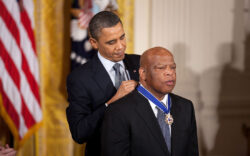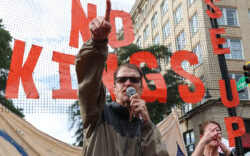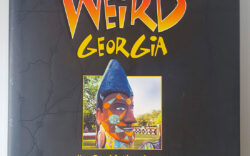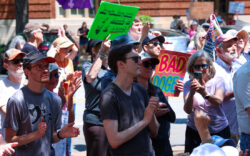Gunfire shattered the calm of the Pacific Northwest as police, protesters and armed vigilantes fought a deadly battle in the region that had long been a tinderbox of tension between the political left and right. When the smoke cleared, there were dead on both sides, but only participants on the left would be arrested and brought to trial.
The time was Nov. 5, 1916, and the place was Everett, WA. The bloody battle more than a century ago was called the “Everett Massacre” and “Bloody Sunday” by the men and women of the Industrial Workers of the World, a radical labor union that hoped to unite laborers of all nations, races, classes and genders into “one big union.”
The IWW union was founded in Chicago in 1905 by a who’s who of the American left, including Eugene Debs, Mother Mary Harris Jones, Lucy Parsons, Ralph Chaplin and “Big Bill” Haywood. Nicknamed “Wobblies,” IWW members quickly forged a radical association of workers who were at the forefront of struggles for better wages and working conditions for laborers across America and around the world when the 20th Century was young. Though the union was never very large in numbers, its influence has echoed through more than 100 years of history. Between 1907–1916, the Wobblies fought a series of “free speech fights” at mines, mills and factories in the American West. IWW members defied police, courts and corporations by pushing for workers’ rights in towns that were owned and controlled by big business interests that used any weapon from jails and judges to bullets and billy clubs to thwart the march of American labor. IWW activists spoke from platforms made from wooden soap boxes until getting hauled off to jail by authorities, thus beginning the folk tradition of “soapbox oratory.” Their technique of mass civil disobedience came nearly 50 years before Martin Luther King, Jr. exhorted his followers to “fill the jails” in protest during the civil rights movement of the 1960s. When law enforcement officers used high-pressure fire hoses to subdue jailed Wobblies, that action presaged by decades the use of fire hoses against black demonstrators in Alabama in 1963.
When dozens of IWW members were brought to trial in the aftermath of the 1916 Everett incident, quick guilty verdicts were expected. Instead, at the end of a two-month trial, the Wobblies were acquitted because, according to author Patrick Renshaw, “the defense demonstrated that no one could tell who fired the first shot and that the vigilantes who died… were likely to have been shot by their own side.” The IWW saw the court’s verdicts as a victory for the union, but the euphoria did not last. America was wracked by hysteria and hatred against domestic dissidents like the Wobblies when this nation entered World War I in 1917, just months after the re-election of President Woodrow Wilson, a Democrat who ran under the slogan, “He kept us out of war.” The IWW was against the war, a stance that angered both the Wilson administration and vigilante groups like the American Protective League. By the time the war ended in 1918, hundreds of Wobblies and other activists had been jailed, and mobs had beaten, kidnapped and lynched many more.
One of the worst clashes between left and right in the Pacific Northwest occurred in Centralia, WA, on Nov. 11, 1919—exactly a year after World War I ended. When the IWW opened a union hall in the lumber town, it was attacked by military veterans, American Legion members, police and armed vigilantes. Gunfire was exchanged, and the mob captured IWW member Wesley Everest, a combat veteran of the war. Everest was lynched in his army uniform, and his bullet-riddled corpse was left hanging from a bridge near Centralia. His killers were never brought to justice.
Today America is again a divided and dangerous nation. A lawless and disorderly president seeks re-election by calling for law and order. Gunfire has erupted in Portland, Kenosha and other cities. Citizens on the left and right today should heed the words of singer Johnny Cash: “Don’t take your guns to town, son. Leave your guns at home.”
Like what you just read? Support Flagpole by making a donation today. Every dollar you give helps fund our ongoing mission to provide Athens with quality, independent journalism.









